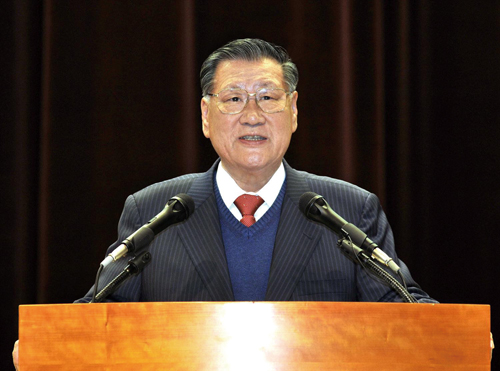Carmaker excels in emerging markets like China and Brazil to make up for smaller increase in the U.S.

Chairman Chung Mong-koo of Hyundai Motor Group.(photo: Hyundai Motor)
Hyundai Motor Co.’s Q2 sales of its cars will go down as the biggest quarterly sales in its history at 23.183 trillion won, which also boosted the first half sales record to 44.551 trillion won, thanks to hikes in overseas sales taking up 23.3 percent of total H1 sales. Domestic sales fell 0.7 percent YoY due to no weekend shifts at domestic car plants because of the labor union.
The company’s total auto sales in the first half came to 2.39 million units, which included huge increases in sales in China, which were up a whopping 35.6 percent YoY, and sales in emerging markets including Brazil, which climbed around 6.3 percent. This made up for the minimal increase in sales in the United States of only 1.2 percent, which was due to Japanese car makers huge sales recovery helped by a low yen and a U.S. big-three automakers’ sales push for pickup trucks.
Hyundai said its operating profit in H1 amounted to 4.275 trillion won, down 7.7 percent YoY, although sales increased 5.8 percent YoY, mainly because of the work stoppages on weekends at some of the domestic auto plants.
The ratio of operating profit versus the sales in H1 also fell to 9.6 percent this year from 11 percent in the same period last year. The record sales numbers were possible with the carmaker doing its best to increase car output at its overseas plants including the United States and Turkey to make up for the slowdown of domestic car plant production due to the labor union walkouts on the weekends.
The U.S. plants kicked up its car output by working around the clock in three shifts, boosting their operating hours to 110 percent of capacity, along with its three plants in China and the new plant in Brazil, which has been at full capacity. As a result Hyundai Motor’s overseas car output surpassed domestic production for the first time at 61.4 percent of total output.
Vice President and CFO Lee Won-hi said the production cost of Hyundai Motor cars went up to 77.5 percent from 76.1 percent due to the labor union’s refusal to work on weekends and the cost of recalls of some models due to malfunctioning brake lamps cost the company 90 billion won.
The top Korean automaker expects second half results will just about remain the same as those in H1 due to the sluggish European auto market and continued low yen, which is projected to bring the global sales of cars down a little further this year than earlier projected.
Korean carmakers will also have a hard time in the second half at home as imports led by German cars wage tough marketing offensives. Hyundai Motor plans to introduce its diesel-powered cars on the market early next year under its new marketing strategy for domestic sales.
In 2013, Hyundai will aim for continued growth and development even though the global economic crisis shows no signs of abating, Chairman Chung Mong-koo said in his statement on the internet home page of the carmaker. “For this, we will adopt ‘brand innovation based on quality’ as our management principle, strengthen our internal capacity through qualitative growth, and pull together the capabilities of all our executives and employees to ensure future competitiveness,” he said. “Throughout the years, quality has always been at the very heart of our philosophy of putting customers first.”
He continued, “We will also expand our R&D investment in eco-friendly vehicles and electronic control systems to secure future competitiveness.”
“In addition, as a global company, Hyundai will proactively adapt to market changes through collaboration and communication not only within the company, but with our diverse partners and suppliers. In the past 10 years, Hyundai has established manufacturing centers in nine major countries worldwide including North America and Europe to become a global company true to its name. This year, Hyundai will implement an organic system of cooperation among our globalized units to achieve our upgraded production goal and respond to the changes in the market even more actively.
“In particular, we will solidify the cooperation and communication between our production and sales units as well as among all our partners including our parts suppliers and dealerships,” the chairman said.
